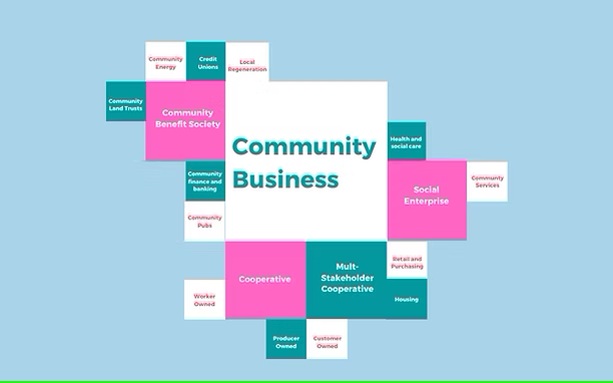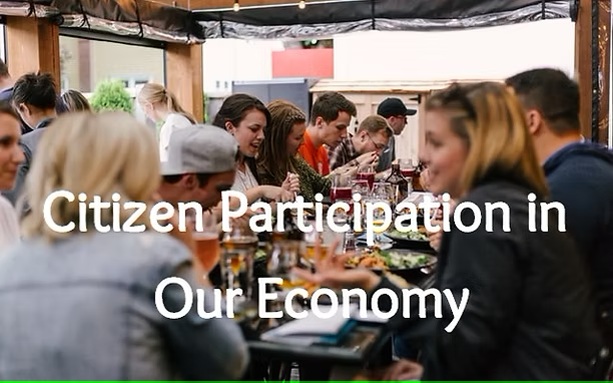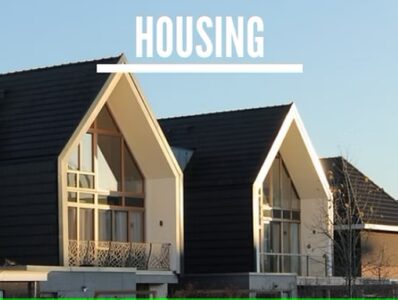Secure, safe, healthy and affordable homes are the bedrock of any resilient economy. This section contains resources from experts about ways to provide housing for resilient and regenerative communities in Devon and beyond, fit for the 21st century. These resources would suit local authorities, community groups and individuals looking for ideas, inspiration and expertise to turn around the housing crisis in Devon.
The housing crisis worsened during the covid-19 pandemic, with rising house and rental prices, but we know that it has been a growing problem. In just one generation, average house prices have risen from £3,000 to over £100,000. In some parts of Devon second homes are on the increase, and people and families are struggling to continue living and working where they grew up or near their support network. They are being pushed out by skyrocketing living costs, seasonal work, zero hour contracts and the limited supply of secure housing.
There are a lot of resources about ‘community-led housing’ below. Community-led housing allows local people to take control of their housing and create alternatives to the limited choices offered by the current housing market. Approaches include self-build, cohousing and housing co-operatives, all developed and run by local people working together. Sometimes this includes partnerships between community groups, anchor institutions like local authorities, and other community partners.
Video (1 hour 20 mins)
What community- led solutions are out there to help address the housing crisis in rural Devon? Could better access to more affordable, sustainable housing help build a fair and inclusive economy in Devon as it recovers from the Covid-19 pandemic and encounters disrupted global supply chains?
An event organised by New Prosperity Devon
Video (8 mins)
Selby Housing Co-operative, SEASALT (South East Students Autonomously Living Together) and Lilliput Housing Co-operative talk about their experiences so far and the highs and lows of their journey.
Video (16 mins)
Excellent talk delivered at a council meeting by Bideford town councillor and homelessness worker Kaye Corfe who explains what homelessness is, the effects of it and about having a choice of where to live.
Video (2 mins)
How to get your community-led housing project up and running in four steps!
Video (3 mins)
How to fund your community led housing project. Use this guide to help you work out the mix of grant, loans and other sources of funding you will need to get your project built, but because all projects are different, the advice contained in this guide will not be definitive. There will be times when you will need to seek further advice or make a judgment about something.

Fair Housing for Frome
Excellent organisational model for any parish, town or city to look at. Fair Housing for Frome (FHfF) is a grassroots organisation that began in November 2015 when a group of local people met to discuss the housing crisis in our town.
Its objective is to support the provision of decent, secure, affordable and accessible accommodation in Frome for local people on low incomes who are being squeezed out by rising prices, stagnating wages and profit-led developments and practices.
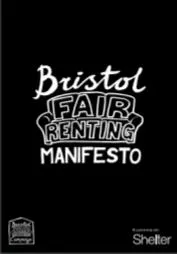
Bristol Fair Renting Manifesto
Renters across Bristol are coming together to expose, to the wider community and to those in power, the reality of private renting. With Shelter Bristol’s support, they have created the Bristol Fair Renting Campaign and launched a manifesto demanding urgent change.
To make Bristol’s renting system fair, affordable, accessible and safe, they have manifesto to demand a set of actions from their city’s political leaders
Video (3 mins)
See for Yourself: Atmos community-led housing, Totnes
Interviews from across the South West aabout this inspiring and innovative project
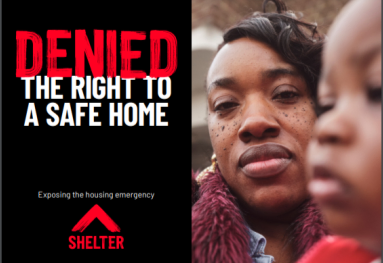
Shelter report
Shelter commissioned research with 13,000 people to bring to light the extent of the housing emergency. The housing emergency is millions of people denied a safe home.
The housing emergency is thousands of families stuck in temporary accommodation, people living on the streets, thousands of private renters paying too much for too little, unable to complain in case they are evicted.
And it’s all those denied a home through discrimination because of their race,
sexuality, gender or disability.
Video (53 mins)
Hear from some of the individuals and communities using collective approaches to tackle a range of housing needs including cohousing, collective self build and mutual home ownership, in this panel discussion with Q&A.
Panelists:
Jenny Rambridge – Hope Cohousing,
John Kinsley – John Kinsley Architects,
Paul Chatterton – University of Leeds / LILAC
Part of the Rural Housing Summit.
Video (1 hour 37 mins)
A chance to hear about the experience of setting up and running community housing groups from the perspective of people of colour:
Our Co-op, Brighton
Heads2Gether
Legacy West Midlands
Leeds Community Homes
Video (1 hour 28 mins)
With guest speakers Jackson Moulding, James Shorten, Rebecca Brewin & Neil Light. This webinar includes What is a Tiny Home?
Fair Housing for Frome Tiny Home Project background & goals, progress so far. How to get involved. Conceptual site plan.
Video (3 mins)
Affordable housing through your neighbourhood plan video by Locality. Find out how the Melbury Abbas and Cann neighbourhood planning group is bringing forward affordable housing in their plan.
Video (1 hour 46 mins)
A workshop on how to raise money through loanstock for community-led housing with Martyn Holmes (Bunker housing co-operative)
Video (55 mins)
How housing associations and community led housing groups can work together to build quality, affordable housing with case studies.
For more detailed guidance see the Practical Guide to Partnerships in this housing section of the New Prosperity Devon knowledge hub
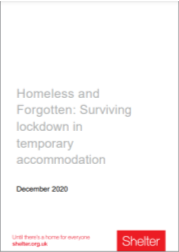
Shelter report
Report: Homeless and Forgotten: Surviving lockdown in temporary accommodation.
Being urged to stay home but having no home to go to. This was the reality for homeless people during 2020’s lockdowns.
This research reveals the total number of people who spent lockdown in temporary accommodation, and shares the experiences of over 20 households who told us what it was like to be homeless in a pandemic.
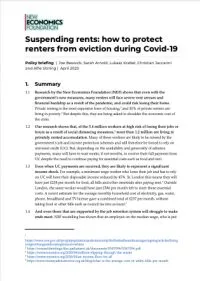
Suspending Rents NEF Report
How to protect renters from eviction during Covid-19
Research by the New Economics Foundation (NEF) shows that even with the government’s new measures, many renters will face severe rent arrears and financial hardship as a result of the pandemic, and could risk losing their home. Private renting is the most expensive form of housing, and 35% of private renters are living in poverty. But despite this, they are being asked to shoulder the economic cost of the crisis.
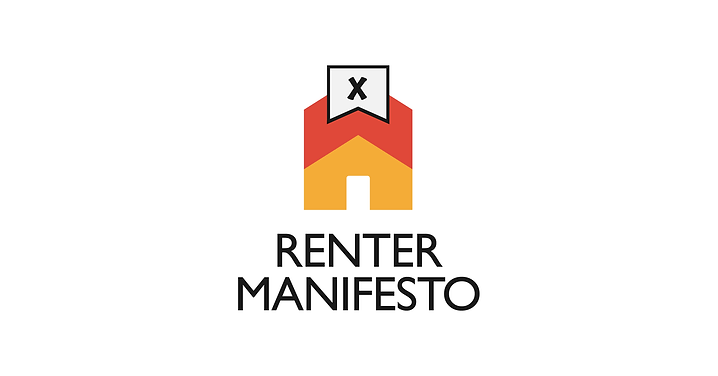
National Renters Manifesto
This National Renters Manifesto sets out the steps needed to ensure that everybody has a secure, affordable and decent home. The manifesto is based on joint work between Generation Rent, London Renters Union, ACORN, Tenants Union UK, Renters’ Rights London and the New Economics Foundation. The manifesto covers six key themes: Security, Affordability, Justice, Conditions, Discrimination, and Housing for People Not Profit.
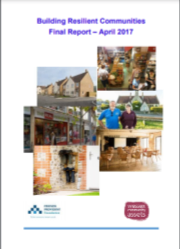
Building Resilient Communities report
Final Report of the ‘Building Resilient Communities’ Project for local economic resilience. The Building Resilient Communities project built on Wessex
Community Assets’ (WCA’s) work supporting the establishment and development of
Community Benefit Societies (CBSs), Registered Societies and Community Land Trusts
(CLTs).
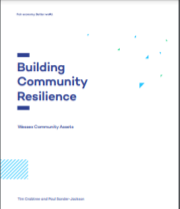
Policy Recommendations
Policy Recommendations from the Building Resilient Communities project, a participatory action research approach, with associates from WCA working alongside volunteers and staff from five CBSs, as they develop new approaches in the face of changing circumstances. The CBSs are:
- Bradworthy Community Land Trust (CLT)
- The Real Food Store, Exeter
- Norton sub Hamdon CLT
- The Red Brick Building, Glastonbury (two projects: Redevelopment of Building C; and Re-imagining the Levels)
- Queen Camel CLT
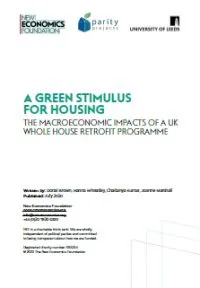
Green stimulus for housing report
This report makes the case that the nature of the recession predicted over the coming years necessitates fiscal stimulus measures to restart and redirect the UK economy. At the same time, the UK’s climate change targets necessitate the ‘retrofit’ of millions of homes in the coming years, involving multiple, integrated building fabric measures, new heating systems and controls, and the widespread adoption of rooftop solar.
Knowledge Hub
There is much more to discover in the Knowledge Hub.



